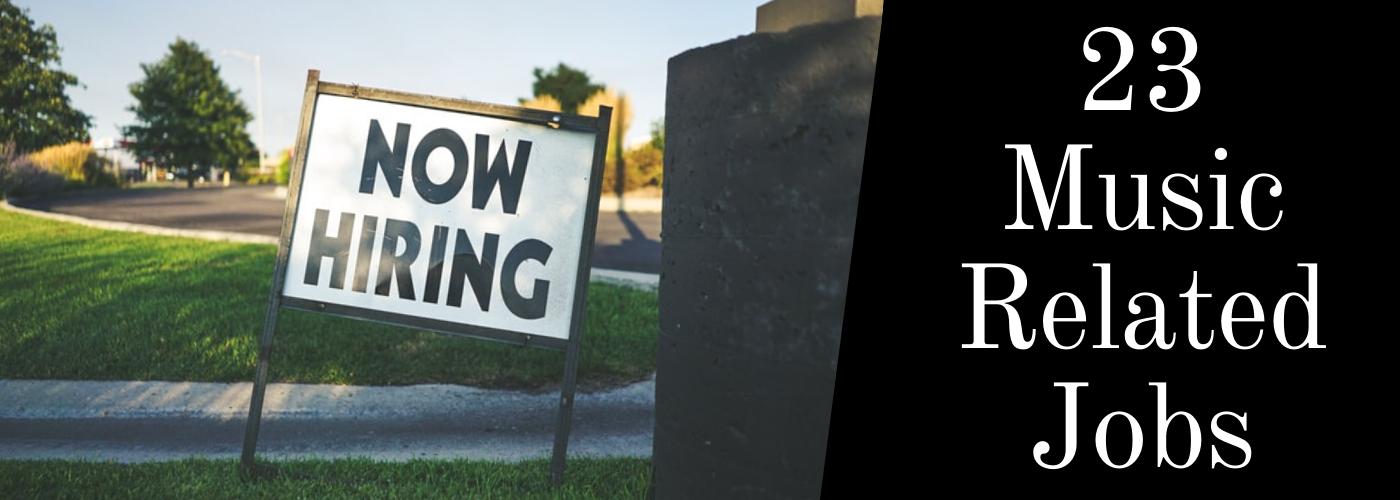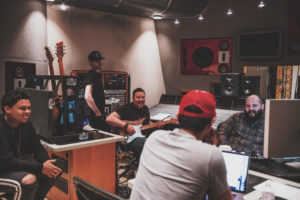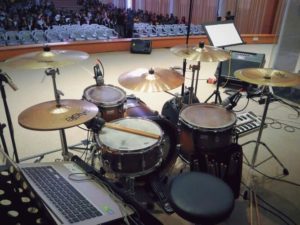
Forming a career for yourself as an independent artist can be a lot of hard work. It’s rare that any musician immediately makes a full time income from performing, so it helps to have another job on the side to support you while you pursue your passion.
The best jobs for a musician are those that offer a flexible schedule and the ability to take time off work for performance opportunities. Because of this, a lot of artists pursue things such as serving food or being a delivery driver, in order to make ends meet.
I need to get a music related job so bad ????????????
— (GD.) (@lifeofxgd) March 9, 2018
While there’s nothing wrong with these jobs, they have the downside of not really pushing your career as a musician forward. What many artists don’t realize is that their are a number of opportunities to work in the music industry, beyond being a performing artist.
Some are more entrepreneurial, providing income on a per-project basis. However, there is also a wealth of normal salary jobs that can appeal to a musician’s skillset. The video below talks about a lot of the behind the scenes aspects of the music industry and things to keep in mind when pursuing a job in music.
So, what are these jobs that musicians can pursue in the industry and what do they entail? In this guide we aim to answer that by breaking down the following music related jobs for musicians:
- Music Journalist
- Instructional YouTuber
- Music Teacher
- Audio Engineer
- Music Producer
- Co-Songwriter
- Sync Writer
- Booking Agent
- Web Designer
- Graphic Designer
- Band Photographer
- Music Video Production
- Music Store Salesperson
- Bar or Event DJ
- Band Manager
- Social Media Specialist
- Bartender For Music Venue
- Live Sound Tech
- Lighting Specialist
- Box Office Agent
- Piano Tuner
- Drum Tech
- Guitar Tech
After reading this guide, you’ll have a better idea of how to take your passion for music and create a steady income.
1. Music Journalist
If you’re a musician who has a way with words, this job may be for you. Although journalism is quite different from songwriting, learning this skill will come a little easier to those who have experience crafting lyrics.

There’s a few directions you can go with this job, the first being a traditional music journalist. In this position you’ll interview musicians or bands, writing features on them or offer events coverage and music reviews. However, there are a wealth of other areas you may find work as a writer in the music industry.
Many bands will hire writers to create content such as biographies or press releases for them. In addition, there are companies who hire writers with experience in the industry, to create instructional articles (like the one you’re reading). Here you can share your experience and knowledge with other like-minded artists.
2. Instructional YouTuber
Much like being a writer, there are job opportunities out there for musicians interested in creating instructional video content.

The easiest place to start would be with a YouTube channel, teaching whatever music related skills you have. These could be instructional videos on playing an instrument, booking gigs, recording music or really anything.
Once you find your niche and build up a following, you can begin to monetize your viewers through things like paid courses, sponsorships or other services. It’s also an opportunity to present your music to a greater fanbase who wouldn’t have found you otherwise.
This sort of thing takes time to grow, so it’s not for everyone. However, there are also companies out there who will hire individuals to create content for them. If you’re looking for a more immediate revenue than running your own channel, this would be the way to go
3. Music Teacher
Those saying there’s no money in music forget about all the people spending money to pursue a career in it. With that in mind, being a private music instructor is one of the most consistent and lucrative jobs you can find as a musician.

Working as a music teacher is one of the most popular jobs for musicians.
There’s two ways you can approach this field of work. The first is to find students and book them yourself, teaching them from home. This usually pays best and offers flexibility in terms of choosing your hours, but it’s a lot of work.
If that doesn’t sound appealing, there are plenty of music schools out there who regularly hire musicians to work for them. In this case you might make slightly less, but you won’t have to worry about finding and scheduling students.
4. Audio Engineer

This is more of a skilled trade in the music industry, but recent years have seen more and more musicians working as audio engineers on the side.
This is due to the rise in home studios and artists tracking their own music. If this is something you have experience in, you may be able to make a small income bringing other artists into your studio as well.
One of the best things about this job is that you’ll constantly be working with other musicians in your area. This is a great way to stay connected to your local music scene, even when you’re not performing.
5. Music Producer
If you’ve recorded a few albums and have a knowledge of what makes a great album, you may be able to help other artists do the same.

Music producers are the visionaries who help bring an artist’s album to life. On top of the work in the studio, the job also entails pre-production, such as budgeting, rehearsals, organizing session musicians and more.
In today’s day and age, it’s getting harder for producers and engineers to find work in their local community alone. Because of this, many have formed online recording studios, much like Sundown Sessions.
If you’re interested in following a similar path, head to The New Music Producer. Here are senior music producer and CEO Chris Shreendyke, shares the secrets to running a successful online recording studio.
6. Co-Songwriter
If you’re the type of musician who’s constantly writing music and doesn’t know what to do with it all, you may be able to find work as a songwriter or co-songwriter for other artists.

Not every performer writes their own music and even if they do, most artists enjoy collaborating with other artists to smooth out a song’s rough edges.
Keep in mind that the income from this job is largely reliant on a song being successful. So, you might not see much money from it right away.
However, the more artists you work with, the greater chance you have of something taking off. Even if nothing becomes a massive hit, all the small royalties from everything will eventually add up and be worthwhile.
7. Sync Writer
Sync writers are the people who write and pitch music to films and TV shows. It can easily be one of the highest paying jobs a musician can find. It allows you to be flexible in your work schedule, well heavily staying involved in music creation.

You may also discover that a lot of the songs you create for your own music career are ideal for Sync placement. In this case, all you have to do is build relationships with TV music supervisors and pitch your music to them.
However, in order to be successful you need to approach them properly. Our sister site Sync Songwriter teaches artist around the world just this. Check out this guide to getting your music in TV and film for more information.
Once you’re ready to take things to the next level, sign up for our Art of The Song Pitch course. There we teach the secrets industry professionals are using to make a viable career in the world of sync.
In the following video, Meghan McDuffee a professional video game and film composer, discusses her journey in this career.
8. Booking Agent
If your the person in your band who handles most of the gig booking, you may be able to make a job out of helping other musicians do the same.

The first way to go about this is by working with bands, reaching out to venues and trying to find them gigs. In this case, you’ll usually be paid a commission of what the act makes at the show.
However, if a salary position sounds more appealing, look into being the house booking agent for a venue. In this position the venue will hire you to find and book the acts that perform. Smaller venues may just pay you a commission of the door but for bigger concert halls this is a staff position.
9. Web Designer

Designing websites for musicians and other music related businesses is the perfect job for a tech savvy artist.
Nowadays everybody needs a strong online presence and a well designed website. So, if you’re the tech savvy type, creating websites for musicians, bands and music businesses may be the job for you.
The greatest thing about the current day and age is that you no longer need to know about complex coding or software to build websites. Platforms like Wix, WordPress and Squarespace make it easy to design attractive web pages that meet clients’ needs.
Start by designing a website for your band, business or friends. If you find you have a knack for it, begin advertising your services to other people in the music industry.
10. Graphic Designer

A lot of artists spend so much time on the music side of things that the visual aspect of their work suffers. However, success in the music industry relies on great graphics, almost as much as it does great music.
So, if you’re the type of musician who’s equally talented in the visual arts, then creating graphics and visuals for other bands may be the perfect job for you.
Whether it’s posters, social media graphics or album artwork, there’s lots of opportunities to make your services available
11. Band Photographer
Another equally important aspect of an artists career are band photos. With social media sites like Instagram taking over, high quality photos are necessary to building a strong online following.

If you already have the experience and equipment necessary to be a photographer, working with musicians can be a fun side job that’s still connected to the industry.
Keep in mind that being a photographer means more than just having a nice camera. You need to have a good eye, understand the workings of a camera and be a good photo editor
However, practicing is the best way to learn. So, if you think this is a job you’d want to pursue, get yourself a camera, head out to concerts and start taking pictures of musicians. If you post them online, tagging the acts, overtime you may find them reaching out to hire you.
12. Music Video Production

The equipment necessary to produce video content for musicians can be expensive, but the income for this job can be worthwhile.
If you’re already working for musicians in the photography world, you may consider finding jobs as a videographer as well. This is a good idea, but keep in mind that their are some major differences between the two roles. This includes both the equipment and skill set required
With that said, if you have knowledge or experience producing video content, this can be a lucrative side-hustle. You’d be surprised at the number of artists looking to hire someone to film, edit and produce their videos.
Beyond music videos, you may also find work filming a band’s live performances or creating promotional video content. Just be sure to charge enough to cover both the filming and editing side of things.
13. Music Store Salesperson

For many musicians, getting a job as a salesperson in a music store is the ideal side-hustle. Not only are you surrounded by music, you’re also surrounded by music industry professionals who are making purchases.
This makes it a fantastic networking opportunity with your local music community. You never know who you’ll cross paths with, but that’s not the only plus to this job.
You’ll most likely get an employee discount, which can help when you need to fund musical purchases of your own. Also, due to the fact that music stores are usually owned by musicians, the managers are often understanding when it comes to taking time off for gigs or other musical endeavours.
14. Bar or Event DJ

It definitely takes a certain type of person to find success in the world of DJing. You have to have a vast knowledge of music in all genres and know what songs were popular throughout the decades.
In addition, having the appropriate gear and understanding how to operate it all is an asset. However, if you can make it work for you, DJing can be an extremely lucrative career.
Best of all, there are many avenues you can find opportunities for work, such as bars, corporate events or weddings.
15. Band Manager
There’s no better way to learn about how the industry works than as an independent artist. If you’ve started to see some success and build up connections in the industry, you may be well equipped to make a job out of helping other musicians do the same.
That is to say, you might consider working as a manager for some acts that you think show promise. Just remember that every niche is different, so you’ll be best suited to work with other artists in your genre.
Payment takes the form of a commission, which can be small when a band is starting out. However, if you work with several acts it can all add up and become a valuable source of income.
If you’re thinking of pursuing this career, check out the video below for some awesome tips on what makes a great manager.

If you have a strong social media presence, you could make a job out of helping other artists and musicians do the same.
Do you have a fantastic Instagram of Facebook page, with awesome content and an engaged audience? Believe it or not, helping musicians and artists maintain a healthy social media presence is a job you could pursue.
In addition to working with bands, you may discover businesses such as recording studios or music stores that also require someone to do this.
17. Bartender For Music Venue

If you’re going to go after a job as a bartender, you might as well work in facilities that host bands and musicians on a regular basis. You’ll have awesome music to listen to while you’re working and you’ll end up meeting plenty of industry professionals.
Whether it be bands, music producers, managers, label heads or anything else, they all go to concerts. Overtime, you may get to know some of them or at least they’ll start to recognize you, which can in turn have a positive impact on your music career.
18. Live Sound Tech
There are tons of jobs for musicians in the world of live sound. This is especially true if you live in a town with a lot of venues or festivals.

There are opportunities to do everything from loading in, to setting up gear or mixing the show. So, you’re able to move around if you find yourself getting bored in one position.
Having a background in audio technology definitely helps in this position. However, if you’re just loading and unloading gear, you won’t need to understand anything advanced.
Although, you may not be directly involved with the music, it’s a great way to understand what goes on behind the scenes of a big production, while still making a regular paycheque.
19.Lighting Specialist

Similarly to live sound, there are plenty of jobs out there for musicians with knowledge and experience as a lighting designer.
Despite being in the same vein as live sound, the skills that differentiate a good live sound engineer and a good lighting technician are quite different.
Because of this, there are a lot less lighting technicians out there. So, if you pursue this as a side-career, you’ll probably find a lot of job opportunities coming your way.
20. Box Office Agent

Every major events hall or music venue hires people to work the box office and take care of ticket sales. As a musician, working a job where you can be one of the first people to find out about upcoming concerts can have it’s benefits.
On the day of events, you’ll probably be taking tickets at the door and depending on the size of the venue, you may get to listen in on some pretty cool shows.
Most venues will also offer deals to employees to see shows on their days off. Finally, it’s a great opportunity to form a positive relationship with a venue that may end up booking your band down the line.
21. Piano Tuner

Thanks to the number of musicians using electric keyboards, the job of the piano tuner is a dying art. However, acoustic pianos are never going to go away and there are still plenty of artists, venues, studios and just average people with pianos that need to be tuned.
With a lack of tuners to tune them, the rates that piano tuners receive can be quite high. If you’re good at what you do, you’ll find that people recommend you to others looking for the same service.
It definitely takes time and dedication to learn this skill, but it can be a rewarding experience. Not only is the monetary aspect ideal, you’ll also find it stretching your musical ear in new ways.
22. Drum Tech
If you’re a drummer who’s always had a knack for tuning and setting up drum sets, this may be the job for you.

Similarly to the job of piano tuner, drum techs play an important role in helping musicians sound their best. Drum techs are the people responsible for re-skinning drums and tuning them to perfection. They often go on tour with acts or find work with recording studios or bands that are planning to record music soon.
Unfortunately, not everyone understands the importance of a drum technician. So, it’s usually the big budget artists that will hire for this role. However, this can be beneficial in a lot of ways, as it means you can charge a larger sum for your services.
23. Guitar Tech

Most guitar players know that their instruments require being regularly set-up, in order to keep the intonation as clean as possible.
Oftentimes, musicians will send their guitars off to someone to take care of it for them. So, if you know how to properly set-up and intonate guitars, you may find a lot of work in this position.
Other things you may find yourself doing as a guitar tech include fixing electronics or, if you’re on tour with a group, re-stringing and tuning instruments between performances.
Conclusion: Music Related Jobs For Musicians
In order to make ends meet as a musician, you’ll probably find yourself working more than one job. There’s nothing wrong with that and if you’re going to work another job, you might as well do something related to music.
If I had a music related job my life would be so much better.
— Rhys Evans (@wecalleditrhys) April 26, 2016
Being a performer is just the tip of the ice berg when it comes to those who are working in the music industry. Other jobs for musicians include the following:
- Music Journalist
- Instructional YouTuber
- Music Teacher
- Audio Engineer
- Music Producer
- Co-Songwriter
- Sync Writer
- Booking Agent
- Web Designer
- Graphic Designer
- Band Photographer
- Music Video Production
- Music Store Salesperson
- Bar or Event DJ
- Band Manager
- Social Media Specialist
- Bartender For Music Venue
- Live Sound Tech
- Lighting Specialist
- Box Office Agent
- Piano Tuner
- Drum Tech
- Guitar Tech
You definitely don’t have to choose just one of these jobs either. In fact, the greater your knowledge and skillset, the better chance you have of finding work in the music industry, in one one area or another.
Who knows, you may enjoy your secondary job so much that it takes over as your primary career path. If this happens, there’s nothing to be ashamed of. You’re still pursuing a career in one of the most vast and exciting industries to be involved in.
If you enjoyed the tips in this guide, be sure to share it with your friends. Check out the rest of the Sundown Sessions Studio Blog for more tips on music business, and songwriting.
